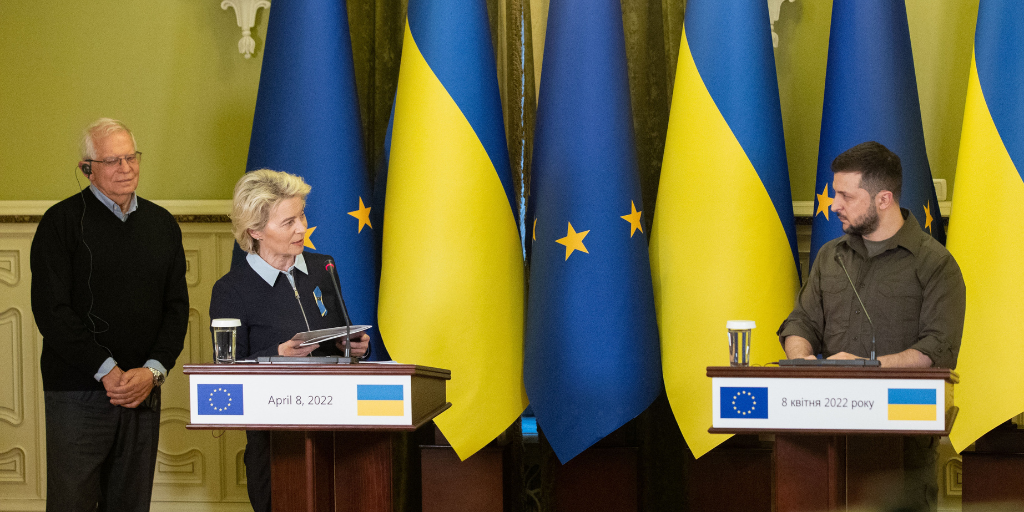On 1 February, representatives of Ukrainian and international civil society organisations sent an open letter to Ursula von der Leyen, president of the European Commission. In the letter, they call on the European Union to support civil society engagement and the incorporation of green principles into Ukraine’s reconstruction process, which will go hand in hand with the country’s EU accession.
Vladlena Martsynkevych, Project leader | 3 February 2023

Meeting of the President of Ukraine with the President of the European Commission and the High Representative of the EU for Foreign Affairs and Security Policy; Credits: PRESIDENT OF UKRAINE VOLODYMYR ZELENSKYY Official website
Read the open letter to the European Commission, signed by Ukrainian and international civil society organisations.
Ukraine has the potential to become a prosperous European state provided that environmental issues are integrated and prioritised in Ukraine’s post-war reconstruction. In order to ensure that recovery at the national and local levels is inclusive, the drafting of Ukraine’s Recovery Plan as the country’s long-term roadmap must be more systematic, transparent and participatory. The Multi-agency Donor Coordination Platform, launched by the European Commission in late January 2023 to support Ukraine’s reconstruction, needs to ensure proper civic engagement in its steering committee.
Key environmental reforms on hold
Since the war started, the implementation of key environmental reforms has mostly been put on hold. The recent adoption of the law on waste management and the law on the national register of emissions and pollutant release are steps in the right direction. However, other reforms in line with the European Green Deal, which are crucial for the green reconstruction of Ukraine (for example, the law on Emerald sites, pollution prevention and control, etc.), have been suspended.
At the same time, threats to the quality of the environment and nature in Ukraine are becoming more and more serious.
Martial law has significantly limited access to information and participatory tools key to the quality work of civil society organisations and civic engagement in environmental impact assessment and strategic environmental assessment. If this continues, Ukraine’s progress on environmental reforms will lack its main driver, eventually hampering the European integration of the country.
In response to electricity shortages, the Ukrainian government and its international partners have focused their efforts on finding emergency solutions. Although generators that use fossil fuels have become a suitable quick fix, they are not sustainable from a long-term perspective. Supplying renewable energy equipment and financial support to scale up renewable energy production in Ukrainian communities and cities would provide a resilient source of energy for years to come.
Civil society should have a say in Ukraine’s reconstruction planning
The draft of Ukraine’s Recovery Plan presented by Ukraine’s authorities in July 2022 at the Lugano conference included controversial projects such as the construction of mobile nuclear reactors; the promotion of the use of peat and wood as ‘green’ fuel at new power plants; and forestry, agriculture and hydropower projects that may lead to the destruction of natural ecosystems.
One important deficiency of the plan is its perception of environmental protection as a sector on its own, where projects are anticipated to be implemented in isolation by a responsible ministry. However, environmental priorities should be integrated into projects in all sectors. Despite their attempts to reach out to the responsible governmental bodies and continue work on the national plan,
civil society organisations were not included in the discussions about further improvement of the plan.
It is important to ensure that the international Multi-agency Donor Coordination Platform not only brings donors together, but also sets common rules and standards for transparency and accountability. Civil society is best placed to provide the checks and balances for programming, financing and implementing the reconstruction in Ukraine, and thus,civil society representatives should be included in the steering committee for the platform.
During the EU-Ukraine Summit, which takes place on 3 February 2023 in Kyiv, civil society organisations asked the European Commission to:
- Enforce an environmental agenda for Ukraine in line with the country’s Association Agreement and the EU accession process.
- Better engage Ukrainian and international civil society organisations, as well as other socioeconomic partners, in the overall decision-making processes for Ukraine’s reconstruction and in the development of the key documents (such as Ukraine’s Recovery Plan).
- Adjust the EU’s emergency support provided to Ukraine to ensure it has long-term ‘green’ reconstruction and sustainable development as priorities (for example, in the energy sector by supplying decentralised renewable energy solutions).
- Ensure that representatives from civil society and local hromadas (basic administrative units) are involved in the steering committee for the Multi-agency Donor Coordination Platform.
Never miss an update
We expose the risks of international public finance and bring critical updates from the ground – straight to your inbox.
Institution: EU
Theme: reconstruction of Ukraine
Location: Ukraine
Project: The post-war Reconstruction of Ukraine
Tags: Ukraine | Ukraine's recovery | reconstruction of Ukraine
